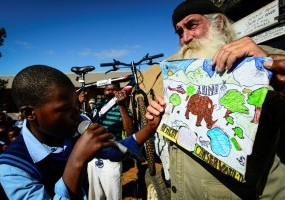COMMUNITY ENGAGEMENT
1. Rhino Art Conservation Education
 The Rhino Art Campaign aims to gather the largest number of hearts and minds messages from young people as a call to action against rhino poaching and all forms of wildlife crime.
The Rhino Art Campaign aims to gather the largest number of hearts and minds messages from young people as a call to action against rhino poaching and all forms of wildlife crime.
Since its inception in 2013, the Rhino Art – Let Our Children’s Voices Be Heard conservation education campaign has reached over 500,000 school children in Southern Africa and Vietnam, educating them on the value of conserving rhino and the corrupt role of international criminal syndicates in the rhino poaching crisis. This award-winning project is run in partnership with the Kingsley Holgate Foundation, the world-renowned modern-day African explorer and humanitarian.
It has proved its worth in helping game reserves build good relationships with their neighbouring, rural communities, with its educational theme that links traditional African culture and heritage to conservation. More information available on the Rhino Art page.
2. Rhino Vision & Rural Relations
Rural communities bordering game reserves need to see thems elves as Wildlife Guardians and active participants in conservation, if they are to become critical partners in ending rhino poaching and other wildlife crimes. Yet, less than 2% of rural youth in KwaZulu-Natal (KZN) have seen a rhino or been inside a game reserve.
elves as Wildlife Guardians and active participants in conservation, if they are to become critical partners in ending rhino poaching and other wildlife crimes. Yet, less than 2% of rural youth in KwaZulu-Natal (KZN) have seen a rhino or been inside a game reserve.
Project Rhino’s NGO members & game reserves are working with community neighbours through the following:
1.The Rhino Vision initiative takes rural youth into wildlife parks to educate them on the value of conservation and the negative impact of rhino poaching and wildlife crime. It also supports community schools by providing conservation and environment-related resources and fun activities such as educational Rhino Soccer Matches.
2.Building positive relationships between communities and their game reserve neighbours, instilling understanding of the value of conservation through tourism and job creation and encouraging community ownership and involvement.
3.Assisting communities alleviate food insecurity and other basic needs through training and resource provision.
